Theresa Smith's Blog, page 156
September 17, 2017
Book Review: Court of Lions by Jane Johnson
About:
Kate Fordham, escaping terrible trauma, has fled to the beautiful sunlit city of Granada, the ancient capital of the Moors in Spain, where she is scraping by with an unfulfilling job in a busy bar. One day in the glorious gardens of the Alhambra, once home to Sultan Abu Abdullah Mohammed, also known as Boabdil, Kate finds a scrap of paper hidden in one of the ancient walls. Upon it, in strange symbols, has been inscribed a message from another age. It has lain undiscovered since before the Fall of Granada in 1492, when the city was surrendered to Queen Isabella and King Ferdinand. Born of love, in a time of danger and desperation, the fragment will be the catalyst that changes Kate’s life forever.
An epic saga of romance and redemption, Court of Lions brings one of the great hinge-points in human history to life, telling the stories of a modern woman and the last Moorish sultan of Granada, as they both move towards their cataclysmic destinies.
[image error]
My Thoughts:
Court of Lions is a stunning novel, the historic detail alone earning it five stars. My edition is the one with the beautiful gold detailing all over it, and while they say you shouldn’t judge a book by its cover, in this case, it’s impossible not to! It’s quite glorious to look at and perfectly conveys the sumptuous setting of the novel.
There are two stories being told within the pages of Court of Lions, both of which are largely set in the Moorish palace complex in Granada, the Alhambra, but spanning centuries apart. In the modern day, we have Kate Fordham, hiding out in Granada from a shockingly brutal past and in the 15th century, we have Blessings, companion to Prince Abu Abdullah Mohammed, the last Sultan of Granada, affectionately known as Momo (which I will use for the remainder of this review). The story that Blessings recounts is fully tragic, it’s history already available to us, while Kate’s is more hopeful, on account of it being entirely fictitious. While Blessings is a character that stems from the author’s imagination, the story he tells is very real, that of the fall of Granada, but with a more sympathetic leaning towards Momo, the last sultan, who, as the author points out, has on a whole been treated rather cruelly by other historic retellings. I found this story, and the entire history surrounding it, absolutely fascinating right from the get go, so you’ll have to forgive me for concentrating within this review on the historic parts of Court of Lions more than the modern story. This is in no way a reflection of my overall enjoyment of the novel. I thought that the two stories complemented each other beautifully, with a serendipitous connection at the end that truly warmed my heart, but the history within this novel – it just can’t be ignored!
Court of Lions is largely a story about the dangers of religious fanaticism, an example of how we, as humans, really don’t seem to be able to learn from history. From the political right down to the domestic, this story shows how even the most peaceful of religions can be warped and twisted to suit a fanatical purpose. It truly is a very clever and quite philosophical novel with a definite agenda in terms of educating through the medium of fiction – my favourite kind!
“How could they destroy a city and the people within from a distance? What honour lies in such warfare, when a man does not face his enemy and fight him hand to hand but kills without even seeing the damage he does? Where’s the chivalry in that?” – Momo, Sultan of Granada.
This particular lament by Momo to Blessings, highlights how clever Jane Johnson has been with this novel. Here, we have the ‘bombing’ of Granadan cities by the Catholic King Ferdinand declared an atrocity by the Sultan, a deeply devout Muslim leader, whose greatest hope was for his people to be able to live and worship in peace in the land they had inhabited for centuries. To my mind, the suggestion here, when placed within the context of current affairs, is clear and apparent. There is much to be learnt about the dangers of fundamentalist ideals, within any religion, from the pages of this novel. Blessings, for all his ‘heathen’ ways, makes a very good point:
“To try to force an entire populace, with all manner of conflicting backgrounds and loyalties, to worship in precisely the same way on pain of torture and death seemed to me violently wrong, perversely cruel.”
Blessings’ own personal story was quite heartbreaking. The confusion he lived with, the despair of unrequited love along with his lack of self-worth; we don’t find out the full extent of how Blessings has suffered until the end of the story. While at times he frustrated me, acting out as a puppet master for his own motivations towards Momo, I still loved him right the way through the story, for never has there been a man more doomed from the start, than poor Blessings.
“Some memories you bury deep. Some you dig up again uncontrollably to get a good whiff of their putrefaction. But no matter how long they have been buried or how often you exhume them they retain their power to poison your life.”
“I had come to believe that the world would somehow change shape to accommodate my love for him. But the world seemed intent on teaching me cruel lessons.”
Kate was also a character I immediately bonded with and her story was quite shocking and disturbing in turn. Within Kate’s story, we see the author bring the elements of religious fanaticism down to the domestic level, and wow, what a story this shaped up to be. As I mentioned previously, Kate’s story has an element of hope to it that was not present within Blessings’ story.
“And suddenly he smiled and his whole face was transformed, as if filled with inner light, and she fell in love with such a ridiculous sensation of free fall that it was as if she were in a dream, plummeting to the ground.”
Unlike poor Blessings, Kate has a chance at love, and I really enjoyed this build up for her, a nice aside from all the fear and disquiet she was enduring.
Court of Lions is filled with beautifully moving passages of insightful observations, intimate introspection, and romantic longing. Out of all of the 400 pages, my absolute favourite quote is this one, spoken to Kate shortly after she has broken down and confessed part of her story to a stranger:
“Sometimes it takes strength to choose the path of weakness. Sometimes surrender is more courageous than resistance. But it’s hard for people to see that.”
That’s a message I really needed to hear right now and it just goes to show that sometimes you can pick up the right book at the right time and the impact this has on you confirms exactly why you love to read in the first place. Court of Lions is nothing short of splendid, the very best kind of fact inspired historical fiction, balanced with an excellent and strongly linked present day tale. I can’t recommend this novel highly enough!


September 14, 2017
My Reading Life: Charlotte’s Web
Welcome to a new series, My Reading Life, where I revisit the authors and novels that have shaped me into the reader I am today.
Charlotte’s Web by E.B. White
[image error]
This week I’m going back, way back, to where it all began. I clearly remember when I was introduced to the treasure that is Charlotte’s Web. I was in grade four in a very small Catholic primary school in a very small rural Victorian town. This was the mid-80s and our school was still run by a Mother Superior and more than half of our teachers were nuns. My teacher, Sister Rose, had decided that she was going to read Charlotte’s Web out loud to us each day after lunch, but she would only read for about 20 minutes, no matter how much we all tried to wheedle her into reading for longer. My grade four self found this pace to be way too slow; it seemed that each time we were really getting into it, we had to stop. When faced with a whole weekend of not knowing what was going to happen next, I decided to ‘borrow’ Charlotte’s Web for the weekend so that I could read it all myself.
I just neglected to ask Sister Rose first.
I had planned to return it first thing Monday morning, to the exact place where it was always kept, but from God’s lips to her ears, Sister Rose knew I’d taken it possibly seconds after I’d slipped it into my reading folder. When she greeted me on Monday morning, instead of punishing me for taking the book without asking, she wanted to know how far through it I had progressed over the weekend. When I told her that I’d finished it, she asked me what my thoughts on it were. Of course I had loved it, and while I was half terrified of her and what she still might have had in store for me as punishment for taking the book without permission, I was also unable to resist answering her questions about it, because it was rare for me to have anyone to talk to about books. I was a bit of an anomaly in my family. At the end of our conversation, I apologised for taking the book without first asking, and then Sister Rose did something for me that no one else had ever done before: she gave me a book to keep. A brand new copy of Charlotte’s Web for myself. Nuns didn’t have much money, we all knew that. Learning about the life of a nun was a key part of our religious education (in the hopes that one of us might decide to eventually become one). Knowing that she had very little money of her own, yet she had still spent some of it on me, was a gesture I appreciated, even at the tender age of eight years old. Sister Rose might have been a bit scary at times, especially if you hadn’t memorised your times tables or you were slacking off with the morning star jumps, but from that moment on, she was my favourite teacher, and to this day I thank her for encouraging my reading instead of reprimanding my bad manners.
As soon as my own children were old enough, I began to read them Charlotte’s Web. My daughter was just the right age to enjoy the movie when they released the new version with Dakota Fanning as Fern and Julia Roberts as Charlotte, a gorgeous adaptation that I purchased on DVD as soon as it was available. Over the years, this has been played for all three of my children over and over, much to our mutual enjoyment.
[image error]
First published in 1952, Charlotte’s Web is a novel that has stood the test of time. Its themes of friendship, loyalty, bravery, and love, are universal, appealing to both children and adults alike. Talking animals and spiders who can spell – the stuff of every child’s imagination brought to life on the page. Each and every time I’ve read Charlotte’s Web I’ve cried over Charlotte and rejoiced over Wilbur. It’s a novel I could never tire of and I hope one day to introduce it to my grandchildren if I’m ever blessed enough to have any. I can’t wait to see their little faces light up with awe when they hear about that first message Charlotte wove into her web:
[image error]
And I can’t wait to hear their laughter over Templeton’s antics. I daresay I could go on about Charlotte’s Web for a very long time, but I’ll end it here in the same way E.B. White ended his marvellous story:
It was the best place to be, thought Wilbur, this warm delicious cellar, with the garrulous geese, the changing seasons, the heat of the sun, the passage of swallows, the nearness of rats, the sameness of sheep, the love of spiders, the smell of manure, and the glory of everything.
Wilbur never forgot Charlotte. Although he loved her children and grandchildren dearly, none of the new spiders ever quite took her place in his heart. She was in a class by herself. It is not often that someone comes along who is a true friend and a good writer. Charlotte was both. E.B. White – Charlotte’s Web, p.169-170.
[image error]


September 13, 2017
Australian Reading Hour
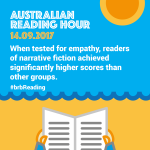
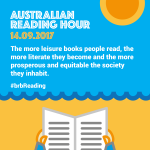
Make a date with a book today for Australian Reading Hour. Reading hour doesn’t take place within any one particular hour, it just means that today, to celebrate reading hour, you should pick up a book and read it for an entire hour. For me, this is pretty standard fare, so why would I even bother signing up?
To promote reading, of course!
Reading doesn’t only improve the mind. It also improves lives and makes better societies by increasing happiness, reducing stress, and improving health.

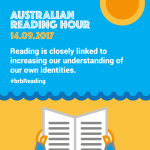
Show your participation today by posting about your reading on social media (if you use social media) with the hashtag:
#brbreading (BRB -Be Right Back)
And if you’re not on social media, then just read your book and leave a comment here to tell me what you’re reading for Australian Reading Hour.
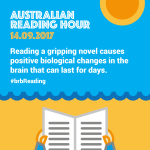
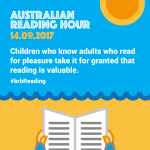
I’m taking a book to work today and come lunch time I’ll be #brbreading even though my break is only for a half hour. I’ll keep reading while I wait at school pick up for my kids and then again when I get home. I might read for more than an hour most days, but today, I’m going to make an effort to read in times that I normally wouldn’t.
Enjoy your reading hour!


September 12, 2017
Book Review: The Beekeeper’s Secret by Josephine Moon
About:
Maria Lindsey has secrets to hide. Living on top of a secluded mountain is a good way to hide from the world… until her past begins to track her down. The surprising and intriguing new novel about the astounding secrets we keep from those we love.
‘Maria knew about guilt. It was a stubborn, pervasive and toxic emotion, and incredibly difficult to shake. Especially if really, deep down, you didn’t think you deserved to let it go.’
Maria Lindsey is content. She spends her solitary days tending her bees and creating delicious honey products to fund orphaned children. A former nun, her life at Honeybee Haven has long been shaped by her self-imposed penance for terrible past events. But the arrival of two letters heralds the shattering of Maria’s peaceful existence.
Pushing aside the misgivings of her family and friends, Tansy Butterfield, on the eve of her marriage, made a serious deal with her adored husband, Dougal. A deal she’d intended to honour. But, seven years on, Tansy is finding her current feelings difficult to ignore. And on top of those not-really-there feelings, Dougal wants to move to Canada!
With captivating characters and an intriguingly tangled mystery, The Beekeeper’s Secret celebrates families in all their joys and complications.
[image error]
My Thoughts:
The Beekeeper’s Secret was a really well thought out story, evenly paced, with likeable characters in honest situations. And the Beekeeper’s secret turned out to be quite a secret indeed, but Josephine Moon handled the unveiling of this in a timely fashion. Rather than drawing out its disclosure, she let us in on the secret quite early on and the story was all the richer for it.
It’s hard to review this novel without spoiling the story for others, so I feel a bit restricted in what comments I can fairly make. Suffice to say, the topic presented at the heart of this story was done so in a very sensitive and well thought out manner. Brought up Catholic and still tied loosely to my religion, I wasn’t sure how I would respond to the issues brought up in this novel, but I found myself appreciative of the author’s intent as well as her skill as a writer to take on such a subject without appearing to be pushing an agenda. Very well done. Josephine Moon has firmly lodged herself into my wall of favourites.
As to the bees. I didn’t know much about bees and honey making prior to reading this novel so I enjoyed all of the factual information that was woven into the story. There was a perfect balance of fact presented to compliment the fiction, a skill Josephine Moon certainly excels at. Likewise, the characters were enjoyable, Tansy endearing and Maria intriguing. I enjoyed Tansy’s relationship with her step-son; what could have been a difficult relationship to navigate owing to their close age gap was handled with grace and confidence by Tansy. She truly was a likeable character and I was championing for her right from the beginning. I was full of admiration for Maria and her situation certainly got my mind churning and thinking about other nuns who may have found themselves in similar scenarios. The supporting characters all filled their roles well and provided for lively scenes throughout.
The Beekeeper’s Secret was a book club pick and it turned out to be an ideal choice. There are plenty of issues, particularly of the moral variety, to discuss and disseminate, and the story on a whole is very engaging and heart warming throughout.
[image error]


September 11, 2017
Behind the Pen with Aislinn Kearns
Today on Behind the Pen we are joined by Aislinn Kearns, author of the military action romance series, Soldiering On. She’s here to share a few of her favourites with us.
[image error]
What is your favourite…
Character from one of your books?
Probably Sam—aka Angelica Samson—from Hotel Hideaway. She’s the most like me, except way more badass and awesome. Maybe she’s who I wish I could be.
[image error]
Scene from one of your books?
I think the opening chapter of Station Alpha is great, one of the best things I’ve written. It’s exciting, fast-paced, unique, and interesting. I’m not sure I’ll ever top it, but I hope I will!
[image error]
Movie of all time?
The Terminator! I know most people prefer the second one, but for me nothing beats the doomed love of Sarah and Kyle. I can quote Kyle’s whole “I came across time for you, Sarah” speech word for word.
Book that you always keep a copy of and recommend to others?
This is so hard, because my tastes change a lot. Plus I like to tailor my recommendations for every person. Also, I’m moving away from physical books and into ebooks. So, I guess I’ll say Suzanne Brockmann’s The Unsung Hero.
Fashion accessory that despite having plenty of, you still keep collecting?
Oh, I’m not much of a fashionista. Do nerd t-shirts count?
Drink that you enjoy everyday?
Tea! English breakfast with soy milk.
Treat you indulge in?
Dark chocolate. Sometimes with a cup of rooibos tea.
Place to be?
Home, snug, comfy and warm.
Person you admire?
I think Caroline Heldman is doing some amazing work for women and minorities.
Season of the year?
Winter, for sure.
To find out more about Aislinn Kearns and the Soldiering On series, head over to her website.
Thanks so much for dropping in today Aislinn! It was a pleasure to have you in for Behind the Pen.
[image error]


September 10, 2017
Book Review: Beneath the Parisian Skies by Alli Sinclair
About:
Lily Johansson returns to Paris, the city that broke her heart and destroyed her ballet career, hoping to ease the guilt over her fiance’s death and to make amends with her estranged sister Natalie, a ballerina with the Boheme Ballet.
Terrified of loving again, Lily nevertheless finds herself becoming entangled with the driven composer Yves Rousseau. Lily has many reasons for keeping Yves at arm’s length but as he recounts the colour, drama and intensity of the Ballets Russes in 1917, the magic of this Bohemian era ignites a spark within her.
Meanwhile, cast in the role of honouring Ballet Russes dancer Viktoriya Budian, Lily’s sister Natalie develops an unhealthy obsession. Natalie’s behaviour becomes increasingly erratic as elements of Viktoriya’s tragic life resonate in her own. Lily fears for her sister’s safety and sanity so when Natalie goes missing, she and Yves set out on a desperate quest across France to find her and, along the way, battle their own demons.
Could the search for her sister, lead Lily to realise that ballet — like love and life — should not be abandoned so easily?
Parisian Dreams (Prequel to Beneath the Parisian Skies)…
About:
When Australian Lily Johansson earns the opportunity to dance for the prestigious Bohème Ballet in Paris, she fulfils a lifelong dream and continues a family legacy — but it comes at a cost.
While Lily falls in love with the City of Light and her professional life catapults her into fame, her personal life suffers as the relationship with her fiancé deteriorates. On a stormy night, an argument sends Lily racing across the road and a speeding car tragically changes her life forever. Lily’s heart, once full of love and hope, is smashed to pieces and her career crumbles into a hopeless mess. Stumbling into a solitary future she’d never planned, Lily must learn to live with the grief of losing the man she loved and find her way in an unfamiliar world.


My Thoughts:
Lovers of ballet and all things French will thoroughly enjoy Alli Sinclair’s Beneath the Parisian Skies and its short prequel, Parisian Dreams.
I began reading Beneath the Parisian Skies fairly late in the evening, and I was instantly drawn into both of the storylines presented: Lily in present day Paris and Viktoriya in the Paris of 1917. I intended on just reading a couple of chapters to get started on that first night, but before I knew it, I could hardly keep my eyes open any longer and I was about 125 pages into the story. The next day at work I read the prequel during my lunch break. It’s quite short, and not necessarily imperative to the story of Beneath the Parisian Skies, but it does provide some context for Lily’s tragedy as well a few early hints about her relationship with Viktoriya. If you’re going to read both, I would recommend not leaving Parisian Dreams until after Beneath the Parisian Skies. You will enjoy it more before or early on in the novel, around the point that I read it.
As far as characters and storylines go, I far preferred Viktoriya’s from 1917. In part this can be attributed to my preference for historical fiction, but I also found Viktoriya to be a much stronger and more admirable character than Lily; her storyline was also far more intriguing to me than Lily’s. Viktoriya’s love affair with Alexi and her relationship with Yana endeared me to her and I was heartbroken to see the extent of the manipulations she had to suffer and how this ultimately affected her destiny. Viktoriya’s story was not as conclusive as Lily’s and I will admit I found this disappointing. Surely there was more to her life in the end than what we saw when we had to leave her? What really made Viktoriya’s story shine for me though, was all of the details Alli included about the Ballets Russes. Her research was meticulous and the way she wove all of this into the story was spellbinding. I love ballet, my daughter is a ballet dancer and has been for thirteen years now, so I enjoyed all of these references and appreciated the efforts Alli has clearly gone to in order to make this story as authentic as possible. The inclusion of real historical personalities was also a nice touch, and again, they were woven into the narrative with authenticity, keeping their historical value intact.
Lily’s story in the present day certainly held my attention, but I did find her to be somewhat tiring at times, and she could be a tad melodramatic (even taking her personal tragedy into account) and also quite self-centred, particularly within her interactions with the very lovely Yves. I could see the writing on the wall with her sister long before she could, which further supports my claims of her self-centredness; Lily noticed what Lily wanted to notice. Anything else was blocked by her wall of grief and guilt, a very unhealthy way to live. And while on the topic of her sister, Natalie was quite a toxic character, and for the most part I felt that Lily’s interactions with her sister were rather realistic, given the circumstances between them. I never really came to like Natalie, and much of her behaviour didn’t seem to have any supporting context; she was indeed a dramatic and odd young woman. While Lily frustrated me at times, she came through in the end and I enjoyed seeing all of the pieces fall into place for her. She really had been dealt a tragic hand, a double whammy, so I certainly bore this in mind whenever she did something that made me want to shake her! I adored the character of Yves, he was truly lovely and every woman’s dream Frenchman.
On the whole, Beneath the Parisian Skies is a beautifully touching novel and I enjoyed it thoroughly. It moves along at a good pace and alternates between the two eras at just the right points within each of the character’s stories. Infused with ballet and rich in its Parisian setting, Beneath the Parisian Skies contains themes of love, grief, ambition, and passion that will resonate with many readers. I highly recommend this novel and put it forward as a great book club pick.
Beneath the Parisian Skies and Parisian Dreams together count as book 58 in my 2017 Australian Women Writer’s Challenge.
[image error]


September 8, 2017
Book Review: The Constant Queen by Joanna Courtney
Book Description:
‘You need not take England without me, Hari, because I will be your constant queen – there with you; there for you.’ Elizaveta is princess of Kiev, but that doesn’t stop her chasing adventure. Defying conventions, she rides the rapids of the Dneiper alongside her royal brothers and longs to rule in her own right as a queen. Elizaveta meets her match when the fearsome Viking warrior Harald Hardrada arrives at her father’s court seeking fame and fortune. He entrusts Elizaveta to be his treasure keeper, holding the keys to his ever-growing wealth – and eventually to his heart. Theirs is a fierce romance and the strength of their love binds them together as they travel across the vast seas to Denmark, Sweden, Norway and Iceland. In 1066, their ambition carries them to Orkney as they plan to invade England and claim the crown …The Constant Queen is a powerful, absorbing novel which tells the story of a daring Viking warrior, his forgotten queen and a love that almost changed the course of history.
[image error]
My Thoughts:
I will confess, that despite being a fan of historical fiction, my reading tastes tend to lean more towards modern history and I don’t usually go much further back than the 17th century. The Constant Queen is set in the 11th century, so normally I wouldn’t have progressed past picking it up and admiring the cover, but I’d been searching for some Viking themed historicals for quite some time now (on account of being a fan of the TV show, Vikings), so sometimes you just have to break out of your comfort zone and take a chance on something new. In this case, I’m so glad I did!
Rich in historical detail, yet not overwhelmingly so, The Constant Queen is a wonderful snapshot of a part of history long forgotten. With an interesting love triangle without the ‘triangle’ so to speak and a cast of characters true to their purpose, I found myself engrossed in this novel right from the outset and ended up reading it quite rapidly over a weekend. There is little to fault with this novel, if anything, perhaps it might have skipped time a little too rapidly in some sections for my liking, but even so, it was still well paced and very engaging.
I’m keen to read more from this author as I really enjoyed her style so I’ll be keeping an eye out for more of these Queens of Conquest novels by Joanna Courtney. I highly recommend this novel for those who love a well-rounded historical saga with elements of romance, drama, adventure, and suspense.


September 7, 2017
My Reading Life: Maeve Binchy
Welcome to a new series, My Reading Life, where I revisit the authors and novels that have shaped me into the reader I am today. To kick this series off, I’m beginning with the Queen of Irish fiction, the late Maeve Binchy.
[image error]
I can still remember buying my first Maeve Binchy novel, way back in 1995, when Rockhampton still had a QBD bookstore and pinching pennies while at university never extended to not buying books, even if did mean tinned spaghetti for dinner most nights. The novel was Circle of Friends, re-released with a brand new movie tie in cover. At the time, on the cusp of my 20s, I was a little in love with Minnie Driver – I really coveted her hair, if truth be told – so to see her on the cover of what sounded like an awesome novel, well, I ended up buying the book even though I’d never read, or even heard of, Maeve Binchy before. I can say now, more than 20 years later, that Circle of Friends is a novel that changed my life, because it introduced me to Maeve Binchy, who still remains my most beloved author.
[image error]
I went on to read every novel released by Maeve, and once I’d exhausted her backlist, I began to buy each new release in hardcover (remember hardcovers?!) as soon as they were available. Some I enjoyed more than others; I favoured her longer novels, the coming of age stories that followed the lives of younger people throughout the years. My favourite Maeve Binchy is The Glass Lake, but this is followed closely by Light a Penny Candle.


What is it about Maeve Binchy’s novels that I came to love so much? First and foremost, they’re unashamedly Irish, which makes them both hilarious – who could forget “You shut yer hole!” from Circle of Friends? – and achingly honest – such as when Kit, in The Glass Lake, discovered her mother was still alive years after her abandonment, but couldn’t forgive her even though she loved her still. I’ve always felt that I could relate to the characters and their lives on so many levels: the Catholicism and the small town miniature, the families that are far from perfect, a life unfolding but not necessarily according to plan, the deep and lasting friendships, the interconnectedness of the character’s lives. I’ve shed so many tears while reading Maeve Binchy, laughed out loud countless times, and bought plenty of copies as gifts over the years. I still have every original copy I ever bought for myself, and have no intentions of ever parting with any of them. I miss Maeve, and I miss the feeling of waiting for each new novel to release, of bringing it home and settling in to read it; the periodic return of an old friend. There are plenty of authors whose novels I enjoy just as much, but even so, deep in my literary heart, there’s a tiny little space that remains empty on account of Maeve Binchy’s passing, even five years on.
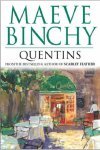


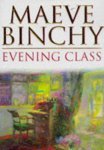

Are you a fan of Maeve Binchy? If so, I’d love to hear what your favourite of hers is. And if you’ve never read one, I highly recommend doing so. Unless you’re not a fan of Irish fiction. But even then, maybe Maeve will be the one to change that for you, so you should read her anyway…you never know, it could change your reading life!
Note: For the purposes of nostalgia, all of the cover images I included in this post are of the editions I own, so if you go looking for any of these novels, they will have updated covers which differ greatly to these.


September 6, 2017
#TBT What I Was Reading This Time Last Year
That would be The Nightingale by Kristin Hannah. I had heard so many good things about this novel that I finally picked it up for myself.
[image error]
What did I think of it?
I loved it. For me, The Nightingale remains one of the best novels I’ve ever read. It was also the novel which prompted me to expand on my book reviewing – there was just so much about it that I wanted to say!
You can revisit my review of The Nightingale here.


September 5, 2017
Book Review: Paris Time Capsule by Ella Carey
Book Description:
New York–based photographer Cat Jordan is ready to begin a new life with her successful, button-down boyfriend. But when she learns that she’s inherited the estate of a complete stranger—a woman named Isabelle de Florian—her life is turned upside down.
Cat arrives in Paris to find that she is now the owner of a perfectly preserved Belle Époque apartment in the ninth arrondissement, and that the Frenchwoman’s family knew nothing about this secret estate. Amid these strange developments, Cat is left with burning questions: Who was Isabelle de Florian? And why did she leave the inheritance to Cat instead of her own family?
As Cat travels France in search of answers, she feels her grasp on her New York life starting to slip. With long-buried secrets coming to light and an attraction to Isabelle de Florian’s grandson growing too intense to ignore, Cat will have to decide what to let go of, and what to claim as her own.
[image error]
My Thoughts:
For me, Paris Time Capsule is a novel that ticks all the boxes: likeable characters, a mystery from the past, a beautiful setting, some romance, some humour, some history, and an irresistible Frenchman. It was quite perfect actually!
I adored the premise of this novel: a decadent Paris apartment abandoned and untouched for 70 years. And while this story is fiction, the apartment is not. I was only a few chapters into the novel when I couldn’t resist any longer; I had to Google this mystery apartment and get a look at it for myself. There are many images of Marthe de Florian’s apartment online and viewing them was like eye candy for a history buff. Here’s a little sample:


The portrait is of Marthe de Florian, painted by Giovanni Boldini. Many of the treasures pictured in the rooms above are mentioned in the novel. Absolutely extraordinary and a fascinating basis for a novel.
What started out as intriguing for me, continued on at a good pace with an engaging story right the way through. While I couldn’t wait to have the mystery solved – why the apartment had been left untouched and then willed to a stranger while family still lived – I was absorbed enough in the daily minature of the characters to not want the ending rushed. The dynamic between Cat and Loic was quite special, right from the outset. Cat’s fiance, Christian, and his persistent American crew, added plenty of humorous moments, although there was a point at which I was willing Cat to just turn off her mobile phone in place of answering every intrusive call. But she got there in the end, and in discovering the mystery surrounding the apartment, she was able to discover a fair bit about herself along the way.
The most special part of this novel for me was the uncovering of the big mystery. I rarely hear or read of a story from WWII that doesn’t touch me – I have personal family connections that always weigh in – but this one in particular left me reeling and wishing that Ella Carey had gone with a dual time frame narrative instead. I would have appreciated more of the WWII story in hindsight. I love this quote towards the end of the novel. Not only does it sum up the reasons behind the apartment being abandoned, but it sums up what every single person who lived through WWII in Europe must have felt like throughout their lives after. I have removed the character’s name and inserted ‘she’ to avoid spoilers.
“She never trusted the world in which she lived after that war. Like so many others, she did not trust that she could share what had happened with those she loved – she didn’t believe they could understand the decisions that had to be made at that time unless they had lived through the terrible period themselves.”
My grandfather had felt the same way. I was fortunate enough to have had him confide in me about some of his WWII experiences before he passed away, but I know he held a lot of it back. Extraordinary lives and extraordinary people.
Paris Time Capsule was my first Ella Carey novel, but it definitely will not be my last. She has great talent as a storyteller and I highly recommend this novel and will be endeavouring to read her others as soon as possible.
Paris Time Capsule is book 57 in my 2017 Australian Women Writers Challenge.
[image error]





